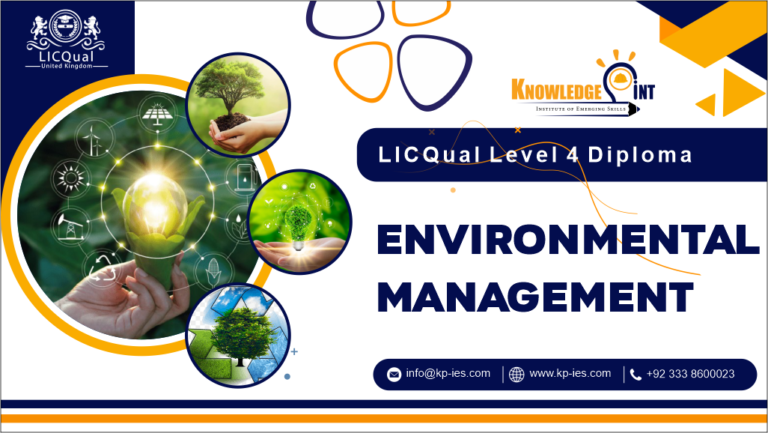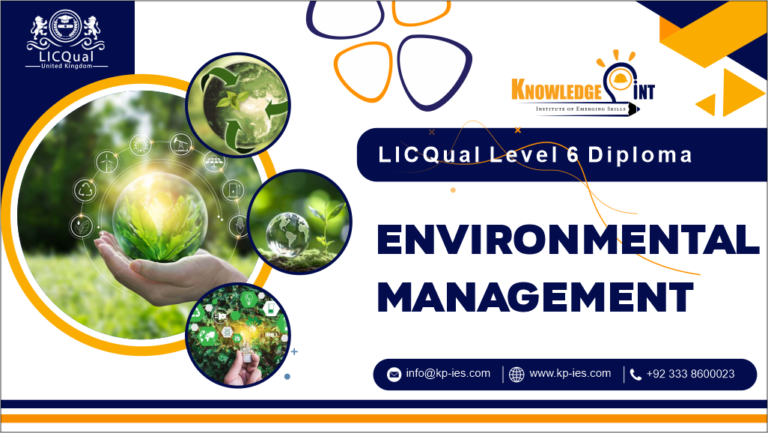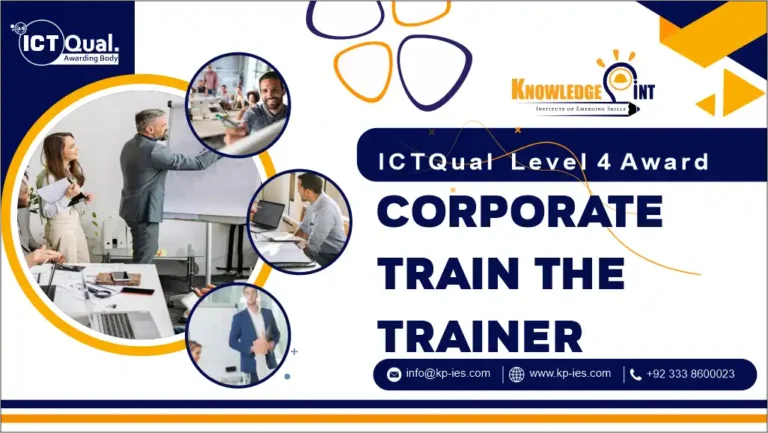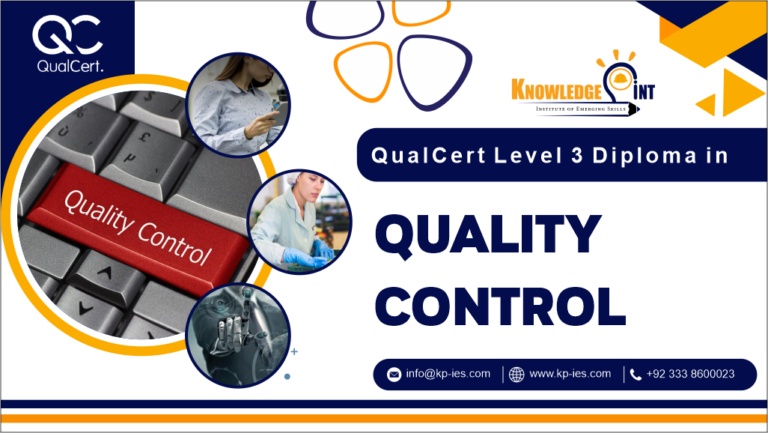In today’s world, the increasing frequency and severity of disasters highlight the critical need for skilled professionals in disaster management. The LicQual Level 5 International Diploma in Disaster Management is designed to provide foundational knowledge and practical skills to those aspiring to make a difference in this essential field. This diploma serves as an entry point for individuals seeking to build a career in disaster management, emergency response, and related areas.
The LicQual Level 5 International Diploma in Disaster Management is an intermediate qualification aimed at equipping students with the essential principles and practices of disaster management. This program is ideal for those who are new to the field or looking to enhance their understanding and capabilities in managing disasters effectively.
This diploma offers a balanced blend of theoretical knowledge and practical skills, ensuring that students are well-prepared to handle real-world disaster management challenges. Whether you are a recent graduate or a professional looking to transition into disaster management, this program provides a comprehensive foundation for your career.
The LicQual Level 5 International Diploma in Disaster Management is your gateway to a fulfilling career in a field that plays a crucial role in safeguarding communities and saving lives. By equipping yourself with the foundational knowledge and practical skills provided by this program, you can make a significant impact in disaster management and contribute to building a safer, more resilient world.
Course Overview
The LicQual Level 5 International Diploma in Disaster Management consists of 6 mandatory units which are as follows.
The learning outcomes of LicQual Level 5 International Diploma in Disaster Management include:
Disaster Management – Theory and Application
- Comprehensive Understanding of Disaster Management:
- Grasp the fundamental theories, principles, and concepts in disaster management.
- Analyze the historical evolution and development of disaster management practices.
- Application of Theories to Practice:
- Apply disaster management theories to real-world scenarios.
- Develop practical strategies for disaster preparedness, response, recovery, and mitigation.
- Critical Evaluation of Disaster Management Approaches:
- Critically evaluate different disaster management approaches and their effectiveness.
- Identify best practices and areas for improvement in current disaster management systems.
- Integration of Multi-Disciplinary Knowledge:
- Integrate knowledge from various disciplines (e.g., public health, environmental science, sociology) into disaster management practices.
- Understand the interconnections between different aspects of disaster management.
Disaster, Crisis, and Emergency Preparedness Communication
- Principles of Effective Communication:
- Understand the principles and theories of effective communication in disaster, crisis, and emergency contexts.
- Develop skills in crafting clear, concise, and effective messages for diverse audiences.
- Communication Strategies and Techniques:
- Design and implement communication strategies for disaster preparedness, response, and recovery.
- Utilize various communication channels and tools (e.g., social media, press releases, public announcements) effectively.
- Audience Analysis and Engagement:
- Conduct audience analysis to tailor messages to different stakeholders.
- Engage communities and stakeholders in disaster preparedness and response efforts through effective communication.
- Crisis Communication Management:
- Manage crisis communication during emergencies, including handling misinformation and rumor control.
- Develop and implement crisis communication plans and protocols.
Risk Perception Awareness in Disaster Management
- Understanding Risk Perception:
- Understand the psychological, social, and cultural factors influencing risk perception.
- Analyze how risk perception affects individual and community responses to disasters.
- Risk Communication:
- Develop strategies for effective risk communication to enhance public awareness and preparedness.
- Tailor risk communication messages to address the specific concerns and perceptions of different populations.
- Behavioral Responses to Risk:
- Analyze how risk perception influences behavioral responses to disaster warnings and evacuation orders.
- Develop interventions to improve risk perception and encourage proactive disaster preparedness behaviors.
- Assessing and Addressing Misperceptions:
- Assess common misperceptions and myths about disasters and risks.
- Develop educational campaigns to correct misperceptions and promote accurate risk awareness.
Gender Inclusive Disaster Management: A Non-Discriminatory Approach
- Understanding Gender Dynamics in Disasters:
- Analyze the differential impacts of disasters on different genders.
- Understand the role of gender in disaster vulnerability and resilience.
- Inclusive Disaster Management Practices:
- Develop and implement gender-inclusive disaster management practices and policies.
- Ensure equitable access to resources, information, and support during all phases of disaster management.
- Addressing Gender-Specific Needs:
- Identify and address the specific needs and challenges faced by different genders in disaster contexts.
- Implement programs that support gender-specific needs, such as reproductive health services and protection against gender-based violence.
- Promoting Gender Equality and Empowerment:
- Promote gender equality and empower women and other marginalized genders in disaster management roles.
- Advocate for the inclusion of gender perspectives in disaster risk reduction and resilience-building efforts.
Foundations of Research
- Research Principles and Methodologies:
- Understand the fundamental principles and methodologies of scientific research.
- Differentiate between qualitative and quantitative research methods.
- Research Design and Planning:
- Design and plan research projects in the field of disaster management.
- Develop clear research questions, hypotheses, and objectives.
- Data Collection and Analysis:
- Conduct data collection using appropriate techniques (e.g., surveys, interviews, observations).
- Analyze data using statistical and qualitative analysis methods.
- Ethical Considerations in Research:
- Understand and adhere to ethical principles in research.
- Ensure the protection of research participants and the integrity of research findings.
Sustainable Disaster Recovery: Operationalizing an Existing Agenda
- Principles of Sustainable Recovery:
- Understand the principles and frameworks for sustainable disaster recovery.
- Analyze the relationship between sustainability and disaster recovery.
- Operationalizing Sustainable Recovery:
- Develop and implement strategies for sustainable recovery that integrate environmental, social, and economic considerations.
- Operationalize existing agendas and frameworks for sustainable recovery in disaster-affected areas.
- Stakeholder Engagement and Collaboration:
- Engage and collaborate with various stakeholders (e.g., government agencies, NGOs, community groups) in the recovery process.
- Promote community participation and ownership in sustainable recovery efforts.
- Monitoring and Evaluation:
- Develop indicators and tools for monitoring and evaluating the sustainability of recovery efforts.
- Assess the long-term impacts of recovery initiatives and identify areas for improvement.
Course Benefits of the LicQual Level 5 International Diploma in Disaster Management :
1. Specialized Expertise
- Auditing Proficiency: Gain specialized knowledge and skills in auditing energy management systems according to the ISO 50001:2018 standard.
- Industry Recognition: Earn a globally recognized qualification that demonstrates your proficiency as an energy management systems auditor.
2. Career Advancement
- Expanded Career Opportunities: Qualify for roles such as Lead Energy Auditor, Energy Management Consultant, or Compliance Officer.
- Higher Earning Potential: Enhance your value to employers and increase your earning potential with specialized expertise in energy management auditing.
3. Industry-Relevant Skills
- Practical Application: Acquire practical skills and techniques for planning, conducting, and documenting energy management system audits.
- Effective Communication: Develop communication skills to interact with auditees, audit teams, and stakeholders effectively.
4. Contribution to Sustainability
- Promotion of Energy Efficiency: Play a key role in promoting energy efficiency and reducing environmental impact within organizations.
- Support for Sustainable Practices: Assist organizations in implementing and maintaining energy management systems that support sustainability goals.
5. Quality Assurance
- Compliance Assurance: Help organizations achieve compliance with ISO 50001:2018 requirements and other relevant regulatory standards.
- Risk Mitigation: Identify areas of non-conformance and provide recommendations for corrective actions to mitigate risks.
6. Continuous Professional Development
- Lifelong Learning: Engage in continuous professional development by staying updated with the latest developments and trends in energy management auditing.
- Networking Opportunities: Connect with industry professionals, auditors, and experts, expanding your professional network and opportunities.
7. Organizational Benefits
- Improved Performance: Contribute to the improvement of organizational energy performance through effective auditing and recommendations for continuous improvement.
- Enhanced Reputation: Help organizations build a positive reputation for their commitment to energy management and sustainability practices.
8. Personal Growth
- Leadership Development: Develop leadership skills to effectively manage audit teams, delegate tasks, and ensure audit objectives are met.
- Confidence Boost: Gain confidence in your abilities as an energy management systems auditor through practical training and hands-on experience.
The LicQual Level 5 International Diploma in Disaster Management provides a solid foundation for those looking to advance their knowledge and careers in the field of disaster management. Upon completing this diploma, graduates have multiple pathways for further academic and professional development.
Academic Progression
- LicQual Level 6 International Diploma in Disaster Management:
- Continue your education with the next level of specialization, which delves deeper into advanced topics and practices in disaster management.
- Bachelor’s Degree Programs:
- Enroll in undergraduate programs related to disaster management, emergency management, public health, environmental science, or a related field to gain a more comprehensive understanding and qualification.
- Postgraduate Programs:
- Pursue postgraduate studies such as a Master’s degree in Disaster Management, Emergency Management, Public Health, Environmental Science, or a related discipline to enhance your expertise and open up advanced career opportunities.
- Professional Certifications:
- Obtain certifications in specialized areas such as Crisis Management, Business Continuity, Risk Assessment, Humanitarian Assistance, or Climate Change Adaptation, offered by professional bodies.
Professional Development
- Entry-Level Positions in Disaster Management:
- Apply for entry-level roles such as Disaster Management Assistant, Emergency Response Coordinator, Community Preparedness Officer, or Risk Assessment Analyst to gain practical experience and build your career.
- Internships and Volunteering:
- Gain hands-on experience through internships and volunteer opportunities with disaster management organizations, NGOs, government agencies, and international bodies.
- Professional Networking:
- Join professional associations and networks related to disaster management to connect with peers, share knowledge, and stay updated on industry trends and opportunities.
Specialized Roles and Career Advancement
- Disaster Management Consultant:
- Provide expert advice and services to organizations on disaster risk reduction, emergency preparedness, resilience building, and recovery planning.
- Emergency Response Planner:
- Develop and implement emergency response plans and procedures for organizations, communities, and government agencies.
- Humanitarian Aid Worker:
- Work with international organizations to provide relief and support in disaster-affected areas, focusing on immediate response and long-term recovery efforts.
- Community Resilience Coordinator:
- Lead initiatives to enhance community resilience to disasters through education, training, and community engagement.
Interdisciplinary Opportunities
- Public Health and Disaster Management:
- Integrate disaster management expertise with public health initiatives, focusing on emergency preparedness for health crises and epidemics.
- Environmental Management:
- Work in environmental management roles, focusing on disaster risk reduction and sustainable development practices.
- Urban Planning and Infrastructure:
- Collaborate with urban planners and engineers to design resilient infrastructure and sustainable urban environments that can withstand and recover from disasters.
International Opportunities
- Global Organizations:
- Join international organizations like the United Nations, World Health Organization, International Red Cross, and other global bodies focused on disaster risk reduction and humanitarian aid.
- Field Work in Disaster-Prone Regions:
- Work in disaster-prone areas around the world, helping communities to prepare for, respond to, and recover from disasters, making a tangible impact on the ground.
- Cross-Border Collaboration:
- Engage in cross-border initiatives and collaborations to share knowledge, resources, and best practices in disaster management.
Continuous Professional Development
- Workshops and Conferences:
- Attend workshops, seminars, and conferences to stay updated on the latest trends, research, and innovations in disaster management.
- Professional Development Courses:
- Participate in continuous learning through professional development courses and training programs to enhance your skills and knowledge.
- Research and Publications:
- Conduct research and publish findings in academic journals and industry publications to contribute to the body of knowledge in disaster management.
The LicQual Level 5 International Diploma in Disaster Management serves as a stepping stone for a rewarding career in a field that is critical to global safety and resilience. By building on the knowledge and skills acquired through this diploma, graduates can pursue further education, specialize in various areas of disaster management, and take on roles that make a significant impact on disaster preparedness, response, and recovery efforts worldwide.







